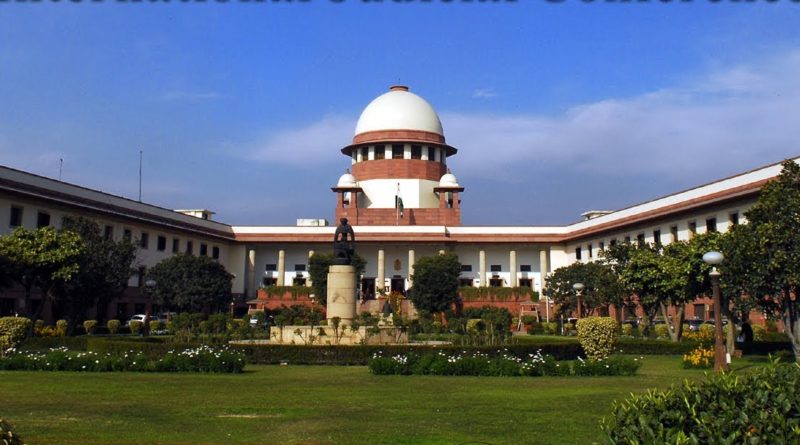“Has Become a practice Now”: SC Court Stays Disciplinary Action Against Madhya Pradesh District Judge Over Allegations of Sexual Harassment
By; – S.M. Hassan Abedi
The Supreme Court has issued a notice in a plea filed by district judge accused of sexual harassment against the decision of the Madhya Pradesh High Court which dismissed his challenge to the findings of a committee that probed the allegations against him.
The Petition was filed through Advocate-on-Record Sachin Sharma.
A bench of Chief Justice SA Bobde, Justices AS Bopanna & V Ramasubramanianwhile issue the notice on the petition remarked that filing complaints against the judges has become a “trend” and that it was a deplorable practice.
A complaint dated 07.03.2018 was submitted by a lady Judicial Officer of the Subordinate Judicial Service against the petitioner alleging sexual harassment at work place.
Senior Advocate appearing on behalf of the district judge pointed out that the judge against whom allegations were made actually had an unblemished service of 52 years and that he was about to be considered for his elevation to the High Court. “what happened is so unfortunate. Then suddenly, the complained surfaced in 2018, he is set to retire this year and is having to undergo embarrassment” he added.
He further added that” Because the petitioner is sought to be victimized by holding on to prolonged enquiry for more than two years and keep the sword hanging over his head apparently to use it at the time when his case comes up for consideration for advancement in his career and such action is impermissible as held by this Hon’ble court in Bani Singh’ case.
GGGGG. Because the petitioner is entitled to be treated with dignity, self-respect and is entitled to honor and social standing in society”
The procedure adopted by the Enquiry officer and states that it was through devoid of principles of Natural Justice,
“Not only that the report of the GSICC is unsustainable in law for reasons aforesaid, it is also in gross violation of the principles of natural justice. It is submitted that Section 11 of the Act read with Rule 7 (4) of the Sexual Harassment of Women at Workplace (Prevention, Prohibition and Redressal) Rules, 2013 [hereinafter referred to as the Rules for short] and Regulation 10 of 2015 Regulations mandate that the principles of natural justice ought to be followed into the inquiry of the complaint by the Internal Committee”
Earlier, a Division Bench of the Supreme Court had refused to entertain the plea filed by district judge fromDewas, Shambhoo Singh Raghuvanshi, seeking quashing of the show cause notice issued to him by the committee. The apex Court had asked him to approach the Madhya Pradesh High Court instead.
The High Court Bench at Jabalpur dismissed the writ petition on August,14 the district Judge moved Supreme Court once again.
The High Court in it’s Judgement observed that “Prohibition of publication or making known contents of complaint and inquiry proceedings. —Notwithstanding anything contained in the Right to Information Act, 2005 (22 of 2005), the contents of the complaint made under section 9, the identity and addresses of the aggrieved woman, respondent and witnesses, any information relating to conciliation and inquiry proceedings,
recommendations of the Internal committee or the Local Committee, as the case may be, and the action taken by the employer or the District Officer under the provisions of this Act shall not be published”
The petitioner contended in his plea that “Most importantly, the petitioner was not even examined as a witness and or given any opportunity to present himself to vindicate his stand leave alone cross-examining the complaint and two other witnesses whose statements were recorded by the Enquiry Officer”
He further argues that
“He is in the zone of consideration in the matter of his further career progression. In fact, the petitioner was called upon very recently to submit judicial record of his judgments which indicate that his case may be under consideration. But at the same time the sword of disciplinary enquiry has been kept hanging over his head in a manner unknown to law.”
The petitioner has averted that the enquiry conducted by (GSICC) is “that there is no power vested with the GSICC to conduct the inquiry in the present case once a conciliation application is submitted by the complainant and the GSICC has recorded a categorical finding that the allegations are not proved and that it would be just and proper to close the enquiry. The GSICC has also no power to form its own opinion once the allegations are not proved. The dismissal of Conciliation application and submission of final report, by the GSICC itself both are simply void in view of Secs 10, 11 and 13 (2) of the Act of 2013 read with Rules made thereunder especially Rule 7 thereof.”
The Petition was filed through Advocate Sachin Sharma and settled by Senior Advocate R. Balasubramanian.
[Read Order]



